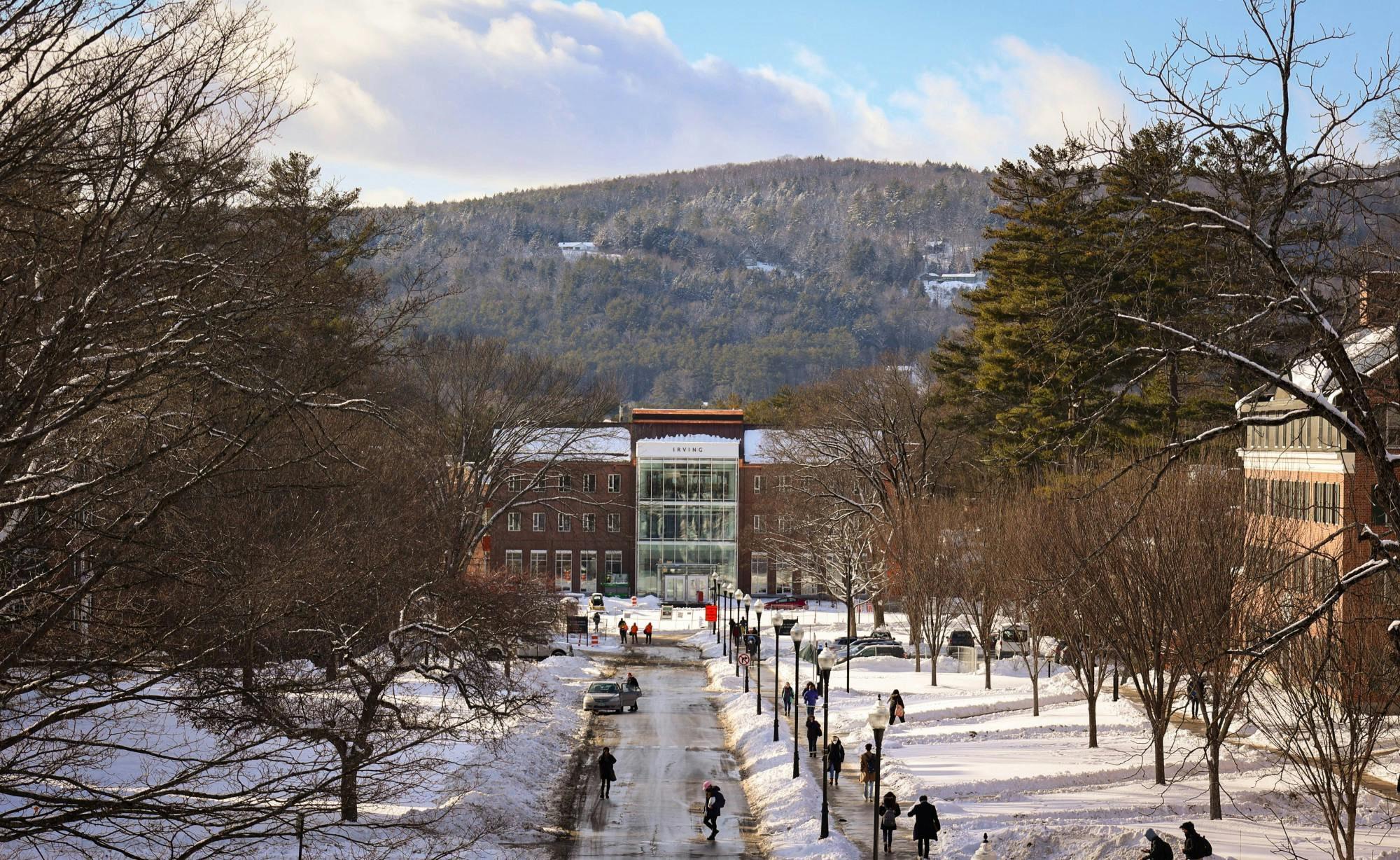After numerous delays, the west end of campus will soon open two new buildings: the Arthur L. Irving Institute for Energy and Society and the Center for Engineering and Computer Science are set to open by this spring. The construction of both buildings was part of the $3 billion Call to Lead campaign, which surpassed its fundraising goal in October.
In a December press release, the College announced the “inaugural home” of the Irving Institute, a $160 million investment towards a “sustainable, equitable energy future” through interdisciplinary teaching and research. The 55,000-square foot building, towering over the end of Tuck Drive and already mostly complete, sits between the Tuck School of Business and the Thayer School of Engineering.
According to inaugural director of the Irving Institute Elizabeth Wilson, the Institute operates and collaborates with other parts of campus, such as the Sustainability Office and Thayer. Wilson said that while the Irving Institute’s current offices in Baker Library offer proximity to the “heart of campus,” the move to the western part of campus will enable the Institute to hold larger events and create more collaboration across campus.
“Having space, being able to host and being able to really create the energy and society community on campus is something we’re really looking forward to building over the next couple of years.” Wilson said.
In addition to housing offices for the Irving Institute, there will be classrooms, laboratories and a cafe, according to Wilson. The Sustainability Office and Tuck’s Revers Center of Energy will also move into the building.
According to Irving Institute communications manager Melissa Weinstein, there is not “an exact date at this time” for when the building will open. However, Weinstein wrote in an emailed statement to The Dartmouth that it would most likely open “within the next month or so.” She added that supply chain issues and labor shortages caused by the pandemic impacted the timeline of the building’s opening.
The College began construction on the Irving Institute in October 2019, while construction on the CECS was temporarily suspended in July 2019 after workers accidentally excavated a 70-foot-deep hole 10 feet south of its intended location. According to past reporting by The Dartmouth, both projects were originally slated for completion last summer.
The 160,000-square-foot CECS, which will stand adjacent to the MacLean Engineering Sciences Center, will house the computer science department, the Magnuson Center for Entrepreneurship and offer additional space for Thayer, according to the computer science department’s website. According to Thayer dean Alexis Abramson, the CECS will double the space that Thayer has, adding onto its existing space in MacLean and Cummings Hall.
Abramson added that the increased space for Thayer will enable the school to create initiatives that draw on both engineering and the liberal arts, such as the Design Initiative at Dartmouth, which sits at the intersection of engineering, the liberal arts education and design.
According to Abramson, although the opening of the building is “a bit of a moving target,” but she expects “with some level of confidence” that classes will be held in the building starting spring term. She added that many faculty will move their offices into the building by the end of March.
Dartmouth will seek LEED Platinum certification for the Irving Institute, which would make it the second building to attain the energy efficiency recognition after the Life Sciences Center. The College’s press release stated that both Irving and the CECS will be the most energy efficient buildings on campus, with around 90% of the Institute’s work space receiving natural light.
Sebastian Fernandez ’24, a communications intern at the Irving Institute, said he is excited about the “shared workspaces” that the building will host. He added that once the building opens, students should visit and see “how energy affects our lives in so many different ways.”
“At the end of the day, energy is interdisciplinary, and involves [fields] like architecture and politics, and involves so many different disciplines and literally anybody on this campus can find a connection to it in their studies,” Fernandez said.
Abramson predicted that the new buildings will bring students to the west end of campus, noting that a new cafe will open in the CECS called the Back of the Napkin.
“We really hope that people across campus … see the building as a place to come together, even if you’re not in engineering or computer science, to work with others … on various curricular, co-curricular and extracurricular type activities.” Abramson said.
Correction appended (12:30 p.m., Jan. 20, 2022): A previous version of this article stated that both buildings would receive LEED Platinum certification and that they would be the first buildings on campus to do so. It has been updated to state that Dartmouth will only seek LEED Platinum certification for the Irving Institute. Additionally, the Life Sciences Center is already LEED Platinum certified.
Daniel Modesto ’24 is the News executive editor. He is from Brooklyn, New York, and is a Native American and Indigenous Studies major modified with Latin American, Latino and Caribbean Studies.




